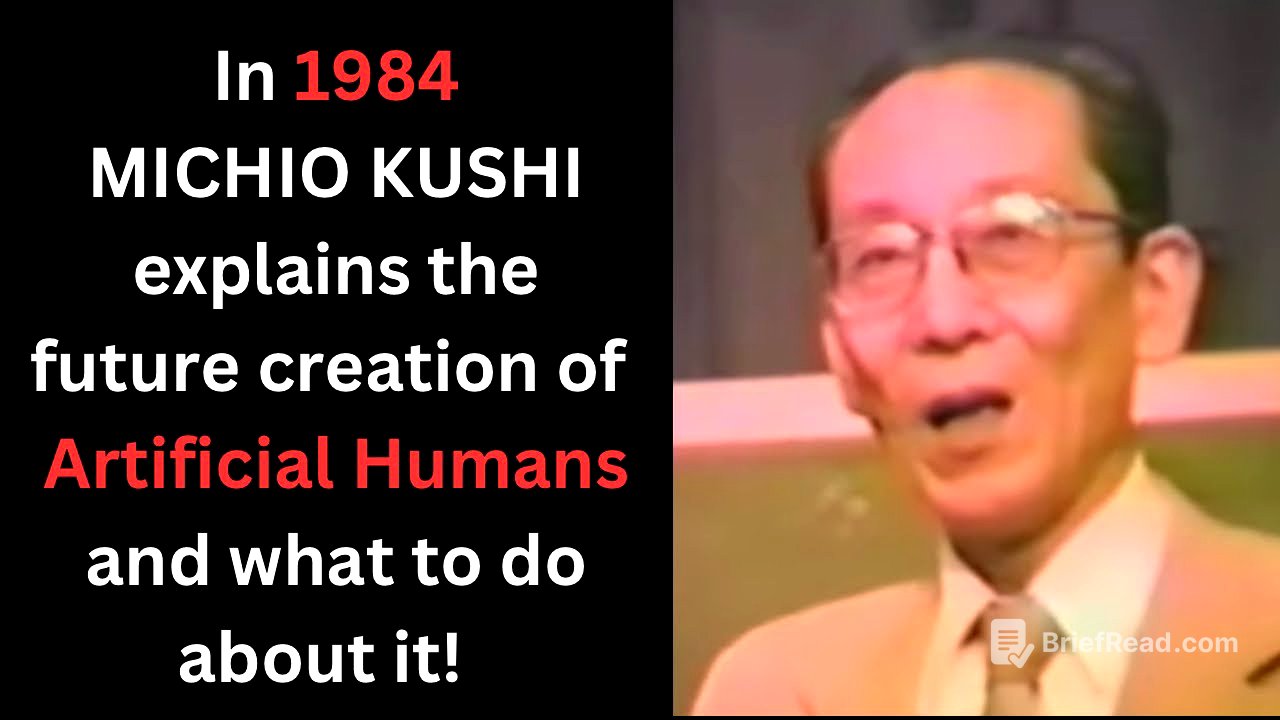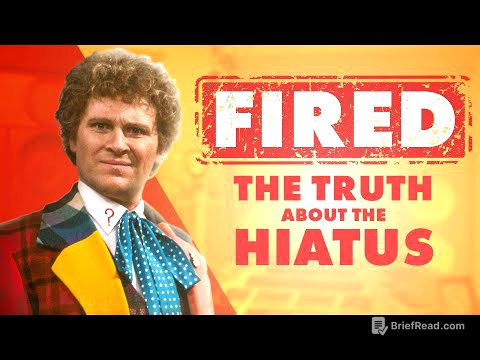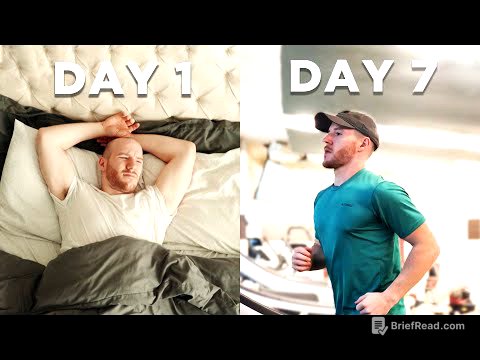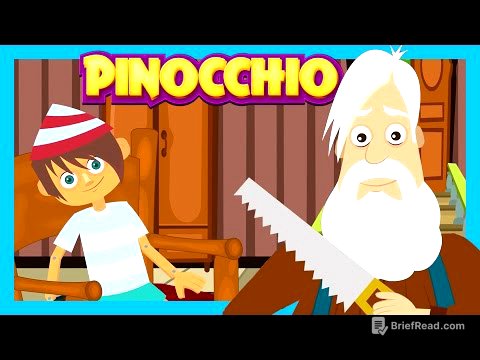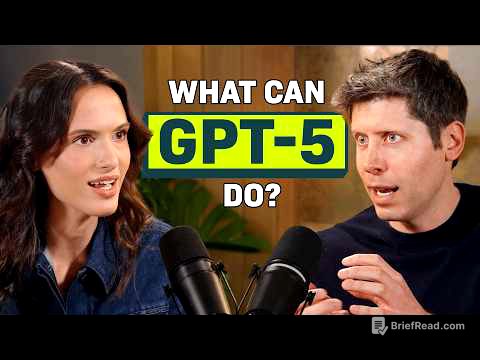TLDR;
The speaker discusses the potential divergence of humanity into two distinct species: one that embraces technological augmentation ("bionation," "psychonation," and "ultra-psychonation") and another that seeks natural recovery and evolution through macrobiotics. He argues that the path of technological dependence, while seemingly advanced, leads to the end of natural human qualities and, potentially, civilization itself. Conversely, he advocates for a return to natural living, gratitude, and a focus on spiritual development to create a healthier, more evolved human species and a peaceful world.
- The speaker contrasts two paths for humanity: technological advancement versus natural recovery.
- He introduces the concepts of "bionation," "psychonation," and "ultra-psychonation" as technological interventions.
- He advocates for macrobiotics as a way to achieve natural recovery and spiritual evolution.
- He warns that the choices made in the next few decades will determine the future of mankind.
Introduction [0:03]
The speaker introduces the idea that humanity is at a critical juncture, potentially splitting into two distinct species by the end of the century. He sets the stage for a discussion about the future of humanity and the choices that will shape it.
Personal Anecdote: A Tale of Two Paths [0:41]
The speaker shares a story about his college friend, Mr. K.M., highlighting their parallel yet diverging paths. Both he and Mr. K.M. studied together at Tokyo University, but after graduation, their careers took different directions. The speaker pursued macrobiotics and natural living, while Mr. K.M. became a leader in the artificial organ industry. This personal anecdote serves as a metaphor for the two paths humanity can take: one focused on technological solutions and the other on natural approaches to health and well-being.
The Rise of Bionation [3:42]
The speaker recounts a recent meeting with his old friend, now the chairman of Japan's Artificial Internal Organs Industry Association. He explains that modern technology has advanced to the point where all human organs can theoretically be replaced with artificial ones, even the entire head. However, the widespread adoption of these technologies is currently limited by market demand and cost considerations. The speaker introduces the term "bionation" to describe this trend of replacing natural organs with artificial ones, driven by the desire to cope with human degeneration. He provides examples such as plastic hearts, kidney dialysis, and artificial replacements for various body parts, including bones, eyes, and teeth.
Psychonation and Ultra-Psychonation: Manipulating the Mind [11:43]
The speaker introduces "psychonation," the artificial control of the human mind through pills, injections, and chemicals in food and drinks, aimed at addressing mental chaos, violence, and depression. He extends this concept to "ultra-psychonation," which involves changing memories and programming fundamental concepts like the definition of God or love directly into the brain. This level of control aims to manipulate the most basic aspects of the human mind and spirit.
Technological Advancements: Robots and Genetic Engineering [15:06]
The speaker discusses the advancements in robotics and genetic engineering, highlighting the potential for robots to become highly sophisticated and even capable of thinking, talking, and acting. He also touches on artificial conception, artificial pregnancy, and the artificial growing of babies through genetic engineering. He notes that these technologies are already widely used in the cattle industry, where artificial insemination and genetic selection are common practices. He warns that declining sperm counts in men may lead to increased reliance on sperm banks and artificial reproduction technologies.
The Divergence of Species and the End of Tradition [20:54]
The speaker argues that these technological advancements are leading to the creation of a new type of species controlled by high technology, communication, chemicals, and mind-altering waves. In this new species, traditional concepts such as religion, art, culture, heritage, and even the meaning of "mother" and "father" may become irrelevant. He suggests that this path represents the end of human traditions and civilization as we know it.
A Dire Prediction: The End of Civilization in 2033 [23:24]
The speaker references a future study conducted with large computers that predicted the trajectory of civilization based on current trends. According to this study, the electronic age began in 1950, followed by the age of bionation in 1980, psychonation in 2000, and ultra-psychonation in 2020. The computer model predicted that civilization would end in 2033 due to these trends, possibly through war or other means, but ultimately driven by the rise of artificialized species.
The Alternative Path: Natural Recovery and Macrobiotics [25:02]
The speaker contrasts the path of technological dependence with an alternative: natural recovery through macrobiotics. He argues that humanity's arrogance and ignorance of life have led to a dependence on artificial solutions. He advocates for a return to appreciation and gratitude towards nature, parents, and traditions. Instead of replacing organs, he suggests curing ailments naturally by changing blood, eating correctly, and recovering a spirit of thankfulness and joy.
The Principles of Natural Recovery [27:52]
The speaker elaborates on the principles of natural recovery, emphasizing the importance of rejuvenating organs, cells, and glands through natural means. He explains that symptoms like cancer arise from unhealthy habits over time and that reversing these habits can lead to recovery. He stresses the need to establish and maintain health through proper diet and lifestyle, while also developing the mind and spirit. This approach aims for physical, mental, and spiritual evolution towards universal consciousness.
Macrobiotics: A Way of Life [30:30]
The speaker presents macrobiotics as a practical and accessible method for natural recovery, suitable for people of all ages and conditions. He highlights the economic benefits of macrobiotic food, which is cheaper than a diet based on meat, cheese, and sugar. He emphasizes that macrobiotics is not just a diet but a way of life that encompasses all aspects of daily living, from sleeping and waking to personal hygiene.
The Choice: Two Roads for Humanity [40:53]
The speaker emphasizes that humanity faces a choice between two roads: the path of technological dependence, leading to the end of natural human qualities, or the path of natural recovery and evolution through macrobiotics. He warns that if the current trend of technological dominance continues, it will be too late to recover mankind's natural way. He likens macrobiotics to building an "Ark of Noah" to save people from the "biological flood" of degenerative diseases.
The Call to Action: Preserving Natural Humanity [44:50]
The speaker calls on his audience to join him in preserving the natural qualities of the human species and developing higher qualities of body, mind, and spirit. He urges everyone, regardless of nationality, race, color, or religion, to embrace macrobiotics and work towards creating a world of paradise. He concludes by expressing his hope that natural human species will continue forever and that people will forget about the route of technological dependence.
